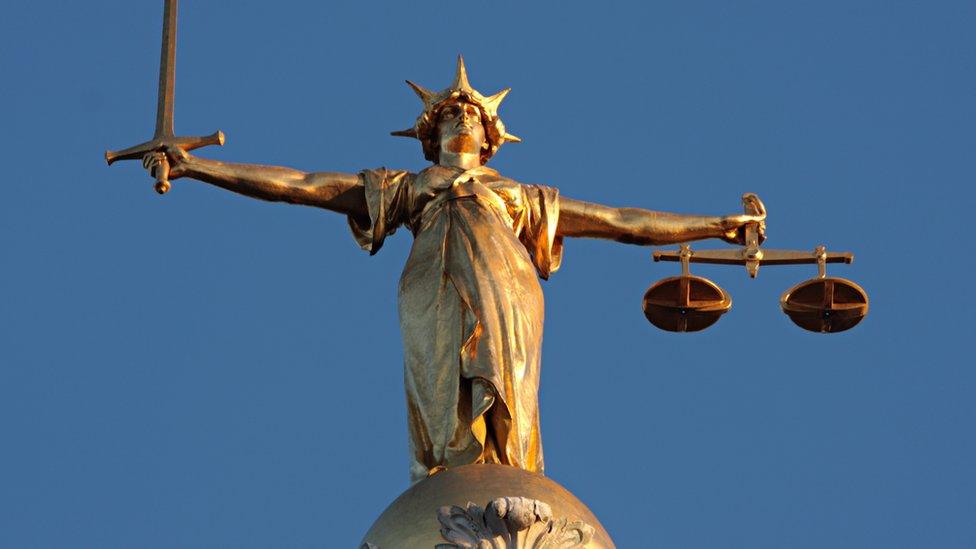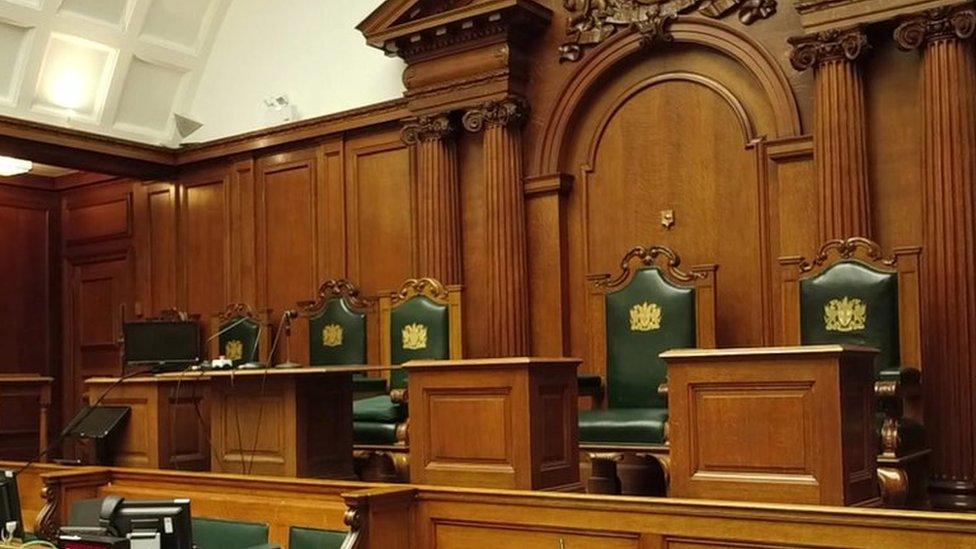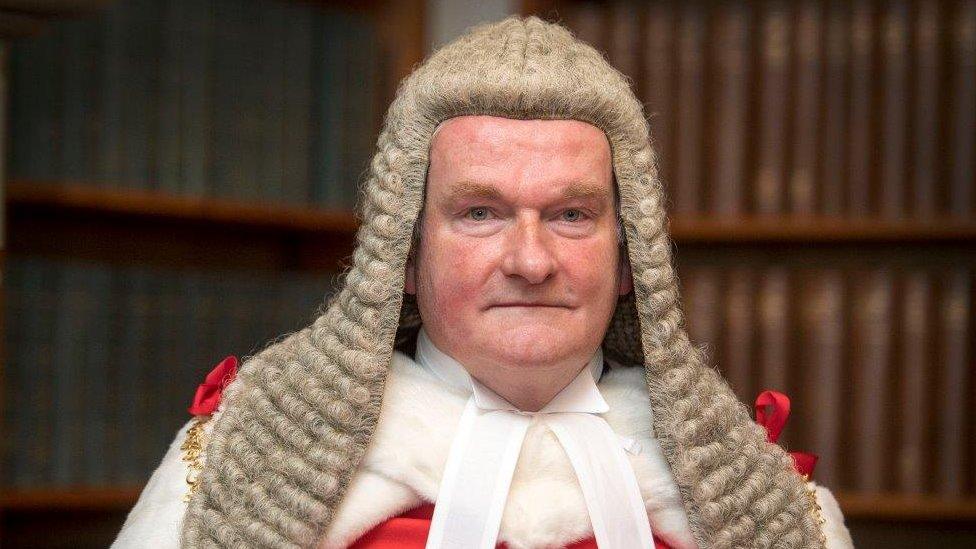Coronavirus: No jury trials longer than three days in England and Wales
- Published

No new Crown Court trials will take place in England and Wales if they are expected to last longer than three days, following concerns from lawyers amid the coronavirus crisis.
They had urged a halt to jury trials to stop "Russian roulette" with the health of legal staff, jurors and the public.
The government says during the current phase of the outbreak, courts and tribunals will continue to operate.
But long cases listed to start before the end of April will be adjourned.
Pressure on the government and judiciary to stop new and halt ongoing jury trials has been growing, as jurors and court staff up and down the country heed government advice to self-isolate.
A statement from the Judicial Office said: 'In all jurisdictions steps are being taken to enable as many hearings as possible to be conducted with some or all of the participants attending by telephone, video-link or online.'
However, Crown Courts where jury trials of the most serious criminal cases take place present particular problems because so many participants, judge, jury, defendants, witnesses, lawyers and court staff need to be present.
The statement continued: "Given the risks of a trial not being able to complete, the Lord Chief Justice has decided that no new trial should start in the Crown Court unless it is expected to last for three days or less.
"All cases estimated to last longer than three days listed to start before the end of April 2020 will be adjourned. These cases will be kept under review and the position regarding short trials will be revisited as circumstances develop and in any event next week. As events unfold decisions will be taken in respect of all cases awaiting trial in the Crown Court."

EASY STEPS: How to keep safe
A SIMPLE GUIDE: What are the symptoms?
TRAVEL PLANS: What are your rights?
IN-DEPTH: Coronavirus pandemic

Trials that are under way will continue in the hope that they can be completed.
Those taking part should follow Public Heath England guidance "suitably adjusted to reflect the distinct features of a court as a working environment for all concerned, including jurors.".
Some criminal barristers in England and Wales have called for the government to go further.
Responding to the statement, the Criminal Bar Association (CBA) - which represents nearly 4,000 members in England and Wales - has called for every jury trial to be delayed for 30 days in order to "allow the public health impact to be properly assessed".
It said: "Barristers choosing to self isolate in following government advice are entitled to leave trials and will not be in breach of their professional obligations."
However, Lord Chancellor Robert Buckland said criminal courts "have a critical role to play and should go on sitting".

Courts would have stood empty if barristers succeeded in their demand to halt all jury trials
Earlier, Amanda Pinto QC, chairwoman of the Bar Council, which represents all barristers in England and Wales, has also called on the government to temporarily end jury trials during the Covid-19 outbreak.
"We are calling for the Ministry of Justice to put an urgent halt to jury trials for the time being," she said.
"Barristers up and down the country are telling us that jurors are having to drop out of cases because they are self-isolating or, worse, coming to court when they should not, and thereby putting everyone's health at risk.
"Being in a jury trial should not be a game of Russian roulette with the participants' health."
Court users "should not be expected to attend court, whilst the rest of the country is very strongly urged to work from home and to avoid 'non-essential contact' and 'confined spaces'," Ms Pinto argued.
Despite government advice to work from home and avoid contact with others, the latest HM Court Service guidance , externalsays: "Jury service is one of the most important civic duties a citizen can undertake and is an essential part of the criminal justice system.
"If you are serving on a jury now, your jury service will continue as normal and you are expected to attend court unless you have a reason not to (for example, you have symptoms or need to self-isolate)."
Jurors considering the alleged murder of PC Andrew Harper were sent home on Tuesday after one of them fell ill, and a juror in the trial of Manchester Arena bomb plotter Hashem Abedi was discharged from service after they went into self-isolation over the weekend.
Criminal barristers who are unable to attend court due to government advice, "will remain compliant with their professional duties provided they continue as normal to give due notice to their clients and to the court", the CBA added.
Scotland and Northern Ireland
There is now a divergence between Westminster and the court systems of Scotland and Northern Ireland.
On Tuesday, the Scottish government announced: "No new criminal jury trials will be commenced or new juries empanelled until further notice.
"This will be kept under review.
"Where jury trials have already commenced, these will run to conclusion of the trial, if practical to do so."
In Northern Ireland, there will likewise be no new jury trials for the foreseeable future after an announcement by the Lord Chief Justice, Sir Declan Morgan.
But jurors serving in a Crown Court trial or an inquest that has already started should continue to attend, the Belfast Telegraph reported.
Many lawyers believe it will be only a matter of time before Westminster follows suit.
'Remote' hearings
The Lord Chief Justice, Lord Burnett, said earlier that there was an "urgent need to increase the use of telephone and video technology immediately to hold remote hearings where possible" in England and Wales.
Emergency legislation is being drafted which is likely to contain clauses that expand the powers in criminal courts to use technology in a wider range of hearings.

The Lord Chief Justice urged greater use of video technology in courts
The halting of jury trials raises a host of highly challenging issues for a criminal justice system that is already beset by time delays due to a reduced number of court sitting days.
With some defendants held on remand, the time limits for holding in custody are likely to have to be extended.
In addition, barristers and solicitors fear they will not be paid and could go out of business or have to lay off staff in law firms and sets of chambers.
Smaller juries?
Some believe another option to keep the system going might be to reduce the number of jurors.
During World War Two, legislation was passed to allow juries to sit with seven members, except in murder and treason cases.
The Law Society Gazette reports, external that one family judge has imposed emergency measures in Berkshire and Oxfordshire, ordering lawyers to stay at home if possible, despite the government claiming courts will continue to "operate normally".
In an email, His Honour Judge Moradifar, the designated family judge for Berkshire, said all suitable hearings should be conducted via video link, Skype or telephone.
Physical presence in court buildings "should be kept to a minimum", witnesses should give evidence remotely where possible and, if coming to court is unavoidable, attendance should be limited to advocates, said the judge.